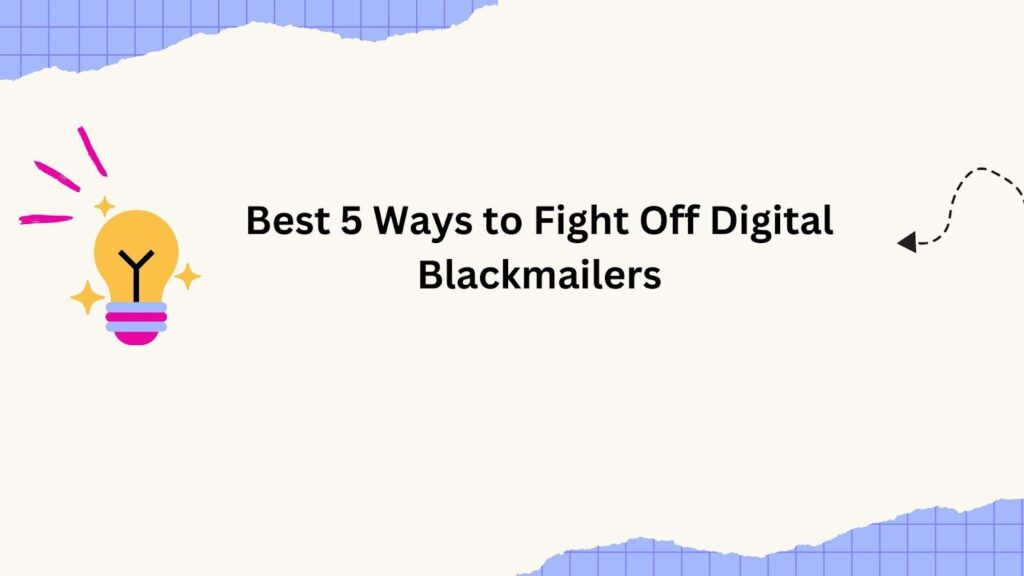The Internet is a fascinating thing that unites people globally in extraordinary ways. While providing a ton of opportunities, it also paved the way for a new type of crooks, felons, and lawbreakers. One of the most disturbing dangers is digital extortion—a deceitful approach, in which blackmailers exploit your private information, intimate content, or confidential data to coerce you for money, favors, or silence. Cybercriminals can target anyone: from teenagers on social media platforms to professionals working with sensitive commercial data.
Digital blackmail can be an overwhelming experience. Luckily, you have a wide range of options to fight off this vicious crime. In the following article, we will explore some of the most successful methods to respond, regain control, and potentially thwart the actions of blackmailers online.
Whether you are already facing a digital threat, or simply want to prepare for the worst-case scenario, these tips will empower you with the know-how needed to take action.
Calm Your Nerves and Do Not Panic
Once you know you are being blackmailed online, your initial reaction might be anxiety, nervousness, and fright. These emotions could even lead you to make payments or fulfill other demands.
This is precisely what online extortionists seek to exploit. Your emotional vulnerability is their passageway to instill feelings of fear, immediacy, and embarrassment. As a result, these predators provoke unwise actions.
Do not panic. Breathe in. Breathe out. Remind yourself that you are not alone, and there are ways to fight off digital blackmailers. Staying calm allows you to precisely plan your next steps, in which you should evaluate the circumstances, collect all proof, and steer clear of rushed actions.
Avoid Complying with Blackmail Demands and Ransoms
For many years online blackmailers referred to scam emails demanding payments, more often in cryptocurrencies, like Bitcoin. It may seem that giving up—paying money, sharing explicit content, or fulfilling other requests—will cause the extortion to stop. Sadly, this is not the case, because blackmailers often feel encouraged by such actions. They see that you are willing to comply, and they will take it to their advantage.
“One last nude photo”, or “the last payment, I swear” are not messages you should believe. Instead of complying with cybercriminals’ demands, cease all communication with them. Rather than trying to satisfy the wrongdoer, focus your efforts on removing the threat for good—by collecting evidence, reporting the occurrence to authorities, and safeguarding your online presence.
Block and Report the Cybercriminals
Whenever you face digital blackmail attempts, block and report the malicious accounts on the platform where you have been targeted. In order to get rid of blackmailers and stop them from contacting you on every medium they have used, you can use built-in reporting and blocking mechanisms. Most social media networks, email accounts, and messaging apps offer key features to report misconduct or extortion, which leads to an internal investigation.
You can report cybercrime on the most popular platforms in the following ways:
- Instagram: Go to the blackmailer’s profile > Tap the three dots > Go to Report > Report Account > Scams or Fraud
- Snapchat: Tap on and hold a specific snap or message > Select Report
- WhatsApp: Open the chat > Tap the contact’s name > Scroll down > Report Contact
- Facebook: Go to the offender’s profile > Tap the three dots > Go to Support or Report
Furthermore, you can also reach out to professional companies that deal with online blackmail and extortion on a daily basis. Experts in digital forensics will guide you through the reporting process to help you get back control of your life. Thanks to their assistance you will be able to implement specific security measures to stop online blackmail from happening again.
Change Your Privacy Settings Online
Strengthening your digital presence should become one of the focal points when it comes to using the Internet. You should not wait until you are being blackmailed, though. Everyone needs to stay safe online, changing privacy settings just in case. With that in mind, be especially wary of phishing schemes, as they are the most common email attack method, accounting for 39.6% of all email threats.
As soon as you handle the direct danger, it is crucial to eliminate any vulnerabilities related to security and privacy. You need to understand that blackmailers usually obtain personal material through compromised profiles, weak passwords, or insecure messaging applications.
Follow these steps to maintain a more private and secure online presence:
- Change your passwords, utilizing long, complicated ones.
- Never reuse your passwords—keep them unique across multiple platforms.
- Switch on two-factor authentication (2FA) for an additional safety layer.
- Analyze any unknown devices connected to your profiles.
- Check for any unfamiliar login attempts on your accounts.
- Utilize password manager apps for creating and safely storing passwords.
- Keep your software and antiviruses updated regularly.
Just as you lock your doors and windows to not let burglars in, so you should protect your digital identity. Do not invite potential extortionists to your online presence.
Stay Educated
Digital blackmailers frequently change their strategies. Your greatest line of defense is educating yourself about the latest trends in cybercrime and cybersecurity. Read reports, real-life stories, and official federal announcements.
Gather all the knowledge you acquire and then share it with your close ones. If you are a parent, educate your children on digital safety. Help them understand what potential risks come from uncontrolled online activity and data oversharing.
While staying informed and safeguarding your own accounts, you can do greater good by informing your family and friends on how blackmail works. The better you and them understand this issue, the more difficult it becomes for extortionists to succeed in their criminal schemes.
Take the Power Back! Final Thoughts
Digital blackmail is a highly intimate and emotionally charged manipulation strategy—but it is also a criminal act that should be fought off, reported, and stopped once and for all. Following the steps described above will help you stay ahead of the latest cyber-attacks. Take preventive measures to steer clear of any potential extortion schemes being aimed at you.
Blackmailers operating on the Internet usually wield fear as a means of control—but that terror reduces as soon as you take well-informed action. The bottom line is that you possess more power than you might think.



